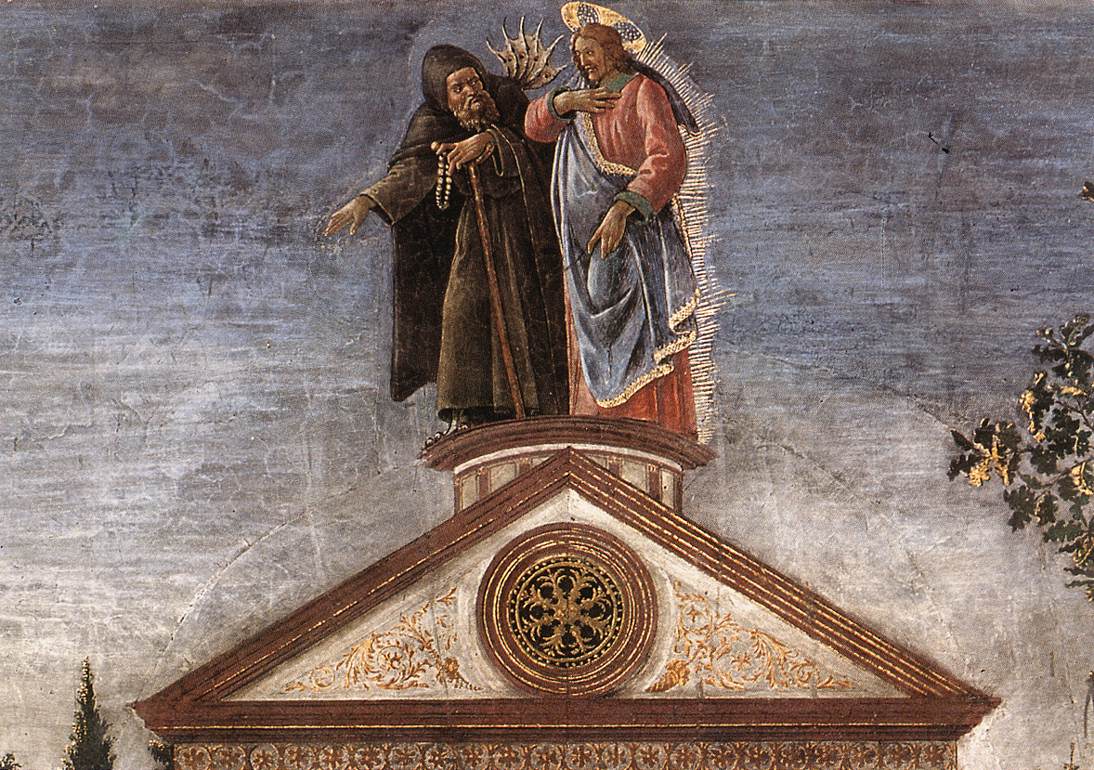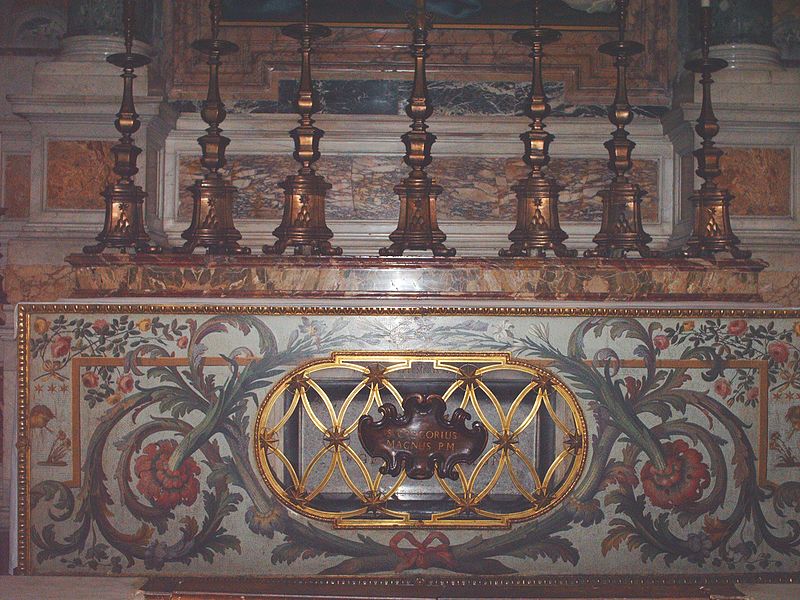Three Temptations of Christ (detail), Sistine Chapel, Botticelli, 1481-82
Readings
(Jerusalem Bible: Australia, England & Wales, India
[optional], Ireland, New Zealand, Pakistan, Scotland, South Africa)
Gospel
Luke 4:1-13 (Revised Standard Version – Catholic Edition)
Jesus, full of the Holy Spirit,
returned from the Jordan, and was led by the Spirit for forty days in the
wilderness, tempted by the devil. And he ate nothing in those days; and when they
were ended, he was hungry. The devil said to him, "If you are the Son of
God, command this stone to become bread." And Jesus answered him, "It
is written, 'Man shall not live by bread alone.'" And the devil took him
up, and showed him all the kingdoms of the world in a moment of time, and said
to him, "To you I will give all this authority and their glory; for it has
been delivered to me, and I give it to whom I will. If you, then, will worship
me, it shall all be yours." And Jesus answered him, "It is written,
'You shall worship the Lord your God, and him only shall you serve.'" And
he took him to Jerusalem, and set him on the pinnacle of the temple, and said
to him, "If you are the Son of God, throw yourself down from here; for it
is written, 'He will give his angels charge of you, to guard you,' and 'On
their hands they will bear you up, lest you strike your foot against a stone.'"
And Jesus answered him, "It is said, 'You shall not tempt the Lord your
God.'" And when the devil had ended every temptation, he departed from him
until an opportune time.
Kyrie eleison, and Intercessions in different languages
Taizé - Pilgrimage of Trust in Rome
Prayer presided by Holy Father Benedict XVI
Prayer presided by Holy Father Benedict XVI
St Peter's Square, 29 December 2012
I can't help reflecting on this gospel in the light of Pope Benedict's announcement last Monday when he said, Well aware of the seriousness of this act, with full
freedom I declare that I renounce the ministry of Bishop of Rome.
When the devil tempts Jesus with the promise of glory and power Jesus quotes from Scripture, You shall worship the Lord your God, and him only shall you serve.
Tomb of St Gregory the Great, Rome
In an audience in 2008 speaking about St Gregory the Great, who reluctantly had become Pope Gregory I, Pope Benedict said, Recognizing the will of God in what had happened, the new Pontiff immediately and enthusiastically set to work. From the beginning he showed a singular enlightened vision of the reality with which he had to deal, an extraordinary capacity for work confronting both ecclesial and civil affairs, a constant and even balance in making decisions, at times with courage, imposed on him by his office.
The following day Pope Benedict said, Gregory remained a simple monk in his heart and therefore was decidedly opposed to great titles. He wanted to be—and this is his expression—servus servorum Dei. Coined by him, this phrase was not just a pious formula on his lips but a true manifestation of his way of living and acting. He was intimately struck by the humility of God, who in Christ made himself our servant. He washed and washes our dirty feet. Therefore, he was convinced that a Bishop, above all, should imitate this humility of God and follow Christ in this way. His desire was to live truly as a monk, in permanent contact with the Word of God, but for love of God he knew how to make himself the servant of all in a time full of tribulation and suffering. He knew how to make himself the “servant of the servants.” Precisely because he was this, he is great and also shows us the measure of true greatness.
Pope Benedict, Zagreb, Croatia, June 2011 [Wikipedia]
Pope Benedict points out that it was his reluctant predecessor who coined the phrase that has become one of the titles that goes with the papacy, Servus servorum Dei, 'Servant of the servants of God'.
The call to be pope is a call to serve. Canon law, No 332, allows for the possibility of a pope to step down. But until now no pope has taken that step for 598 years and the previous few instances of it happening have been surrounded by controversy.
Blessed John Paul II wrote a letter of resignation in 1989 to be implemented in very specific situations that might arise. But he chose to remain pope until his death, despite his increasing incapacity in the last couple of years. Many of us were moved by his last public appearance on Easter Sunday 2005, six days before his death, when this once very athletic man with a powerful voice could only stand at his window and give a wordless blessing. Was his temptation to leave office, a temptation that with God's grace he didn't yield to?
Was the temptation of Pope Benedict to cling on to his office of service when he judged that he wasn't capable of doing so? Did he, with God's grace, refuse to yield to that temptation?
None of us can ever fully know the depths of another person. But we can be touched by the actions of others.
Was it part of Blessed John Paul's vocation to teach us the value of suffering in old age, the value of accepting infirmity and disability, to refuse to yield to the temptation not to serve any more?
Is it part of Pope Benedict's vocation to teach us the value of letting go of authority in order to allow another to exercise that same God-given authority in serving the Church and the world?
Many adult children and their parents are faced with choices such as Pope John Paul and Pope Benedict have faced. It can be a source of great anguish when it is clear that an older parent needs full-time care, the kind of care that their adult children cannot give, the kind of care that means their leaving home. I have never been faced with this situation as my mother died suddenly at 55 and my father at 74. But friends have told me of their suffering in this situation.
Fr Gabriel Harty OP (above), known as the Irish Rosary Priest and now over 90, wrote in Pioneer magazine last November:
As National Director of the rosary apostolate for almost sixty years, I realise that I had made a name for myself in certain quarters and that I had, as it were, built up a little kingdom of my own. Then one day I heard the news, that I was no longer to be in control. A big white van came down from the North to clear everything out of what was once my office, my home, my sanctuary to establish the rosary Centre elsewhere. I confess that I felt angry. Like so many at this time of recession who find themselves redundant, or like those who have to move aside to let the young take over, I went through a process of grieving. I confess that I failed to recognise the times, or come to terms with my own declining years.
In the midst of a time of darkness, it was the Lord's own prayer that helped me. Unable to run around the country anymore preaching to the crowds, I took time to walk up and down the Gethsemane back-garden of a dear friend who understood my predicament. As I would begin the Our Father, it would slowly dawn on me, that it was not my name that mattered or my kingdom that had to be preserved . . .
We will be without a Holy Father for some weeks because at 8pm Roman time on 28 February Pope Benedict XVI will renounce the papacy. Before Easter, God willing, we will have a new Holy Father.
Lent is a time of prayer, penance and renewal for the whole Church and for each member, a time to prepare to celebrate the great Feast of Easter, the Resurrection of Our Lord and Saviour Jesus Christ. Pope Benedict's decision 'sharpens' all of this for us. A time of renewal is also a time of gratitude. We can thank God for Pope Benedict's gentle ministry, one in which he kept reminding us that our faith is in a Person, Jesus Christ, God who became Man.
This Lent is a time for earnest prayer that each of the cardinals who will assemble in March in Rome to elect a new pope will desire to be fully open to the Holy Spirit so that the one they choose will be the one whom God wills to be our new Holy Father. Let us pray that they will not be tempted to see the election as anything other than a searching for God's will as to who should be the next Servus servorum Dei, 'Servant of the servants of God'.
+++
The memorial of the Seven Holy Founders of the Servite Order is observed on 17 February. However, since it falls on a Sunday in Lent it is 'by-passed' this year. This order of friars was founded in 1233 by seven businessmen in Florence, Italy.
The website of the Province of the Isles (Britain and Ireland) is here, that of the USA Province here. Below is a vocations video prepared by the Servites in the USA.






No comments:
Post a Comment